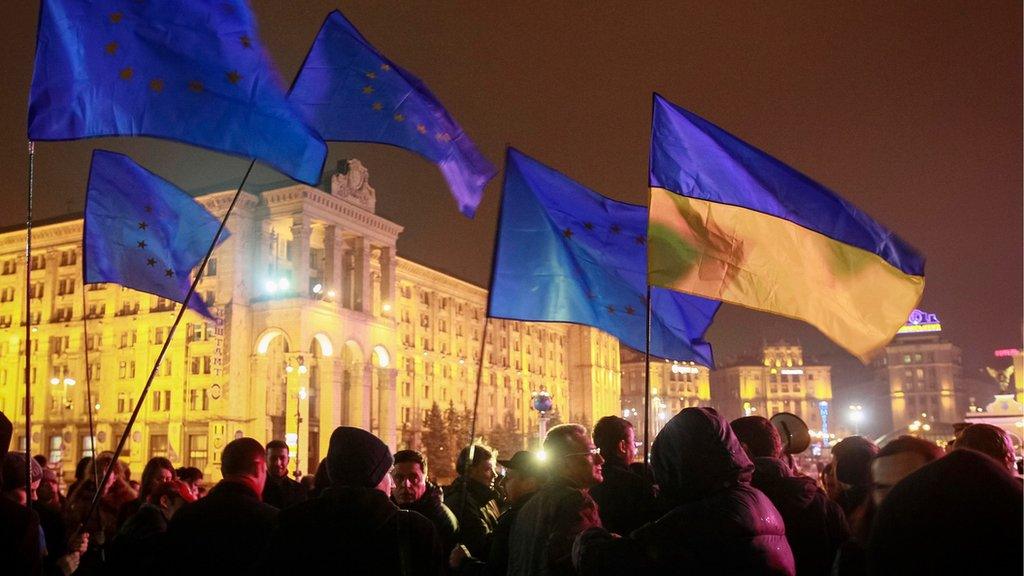Ukraine wooed by rival suitors
- Published
The opera is Italian but the plot could well be about Ukraine
At the Opera House in Kiev, the curtain rises on a story of love, rivalry and rejection.
Up on stage, a poor peasant and an army sergeant compete for the hand of a fair maiden. The opera is 19th Century Italian, but the plot could well be 21st Century Ukraine.
This country, the second largest in Europe, is being courted by East and by West. The European Union has tempted Ukraine with the offer of a historic free trade and political association agreement; but Russia wants Kiev to join its own economic bloc.
The pressure on Ukraine to decide who to embrace has been huge.
That includes economic pressure. At the Roshen sweet factory in Kiev, thousands of little chocolates packed with nuts and cognac trundle down the production line.
Earlier this year Moscow banned imports from this, Ukraine's flagship confectionary company, citing health concerns.
It imposed trade restrictions, too, on other Ukrainian companies. A not-so-subtle hint that Kiev should think twice before turning its back on Moscow.
'Price for freedom'
"The whole world is absolutely clear that the real reason is political," says Roshen's owner, Petro Poroshenko.
Mr Poroshenko, a former Ukrainian foreign minister, says it was he who launched negotiations with Brussels on the Association Agreement back in 2007.
"It's a form of pressure on Ukraine because of the necessity to make a strategic decision about our future development. We're fighting for our own future, our European future.
"And if I have to pay an enormous price, millions and millions in losses because of the Russian ban, then that is the price for freedom."
Last week the Ukrainian government announced its strategic decision.
In a rowdy session of parliament, the country's prime minister said that the cabinet was putting on hold the Association Agreement with the EU: it would concentrate instead on repairing economic ties with Moscow.
"Over the last year trade between Russia and Ukraine fell by 25%," Ukraine's Minister for Energy Eduard Stavitsky tells me.
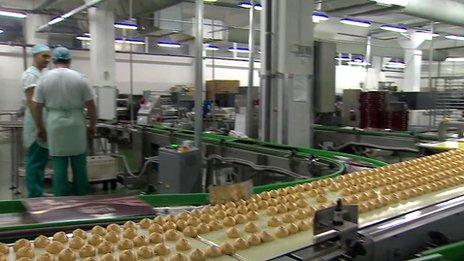
Russia banned imports from the Roshen sweet factory citing health concerns
"That's a huge blow to our economy and we can't ignore it."
I ask the minister if Kiev had requested compensation from the EU.
"I've attended many meetings with EU officials where this question was raised. We discussed this months ago. Unfortunately, all we got in return were declarations that Ukraine would profit from a deal with the EU in the medium to long term.
"We need to progress from talking politics to more down to earth questions, like these economic issues."
The European Union rejects the idea it should compensate Ukraine for losses caused by Russia.
"These losses are not because of the European Union Association Agreement," the EU's ambassador in Kiev Jan Tombinski explains.
"They are because of a decision taken elsewhere. Probably we should ask the other partner to pay the compensation."
Anger on streets
Kiev's decision to turn to the east looks like a defeat for Brussels and a geopolitical victory for Russia.
"For nearly 20 years, Russia and the European Union have been conducting on the former Soviet space a zero-sum game," says Sergei Karaganov of Moscow's Council for Foreign and Defence Policy.
"Russia has been winning and doesn't want to lose even a single point. But this game is to the detriment of Europe, because it loses the possibility of building up a relationship with Russia.
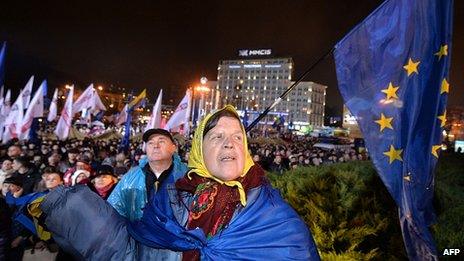
Pro-EU protesters have taken to the streets in Kiev
"It is clearly to the detriment of Russia because it is getting estranged from Europe. And it is simply terrible for the countries in between like the Ukrainian people who are suffering in this game tremendously."
The Ukrainian government's decision has sparked anger on the streets of Kiev, where pro-EU protesters have clashed with riot police.
Demonstrators accuse the authorities of dragging Ukraine back to the Soviet Union - and President Viktor Yanukovych of selling out to Moscow to stay in power.
"Yanukovych thinks about himself, about his personal chances to win the presidential election of 2015," says Serhiy Taran of Kiev's International Democracy Institute.
"And what does he think? He thinks that the European Union would demand transparent and fair elections. But Russia wouldn't care about procedures during presidential elections."
Polls favour EU
In a televised address to the Ukrainian people on Monday night, President Yanukovych claimed he remained committed to a "European Ukraine".
But, in a reference to the economic "pressure" Ukraine was under, he said his priority was to save jobs, protect pensions and maintain "peace and calm" in the country.
Back at the Opera, predictably, there is a happy end as the maiden falls in love with the peasant and they walk off into the sunset.
On the political stage, of course, there is no romance - just pure calculation.
For now, the Ukrainian authorities have calculated that Moscow is their best choice. But President Yanukovych still plans to attend the EU summit - and he knows (because the polls tells him) that more Ukrainians favour closer ties with the EU than with Russia.
Perhaps there is still time for an unexpected twist before the curtain falls.
- Published25 November 2013
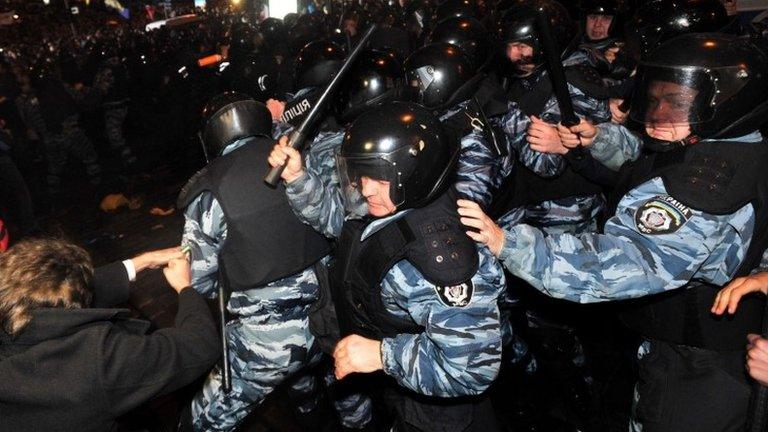
- Published25 November 2013
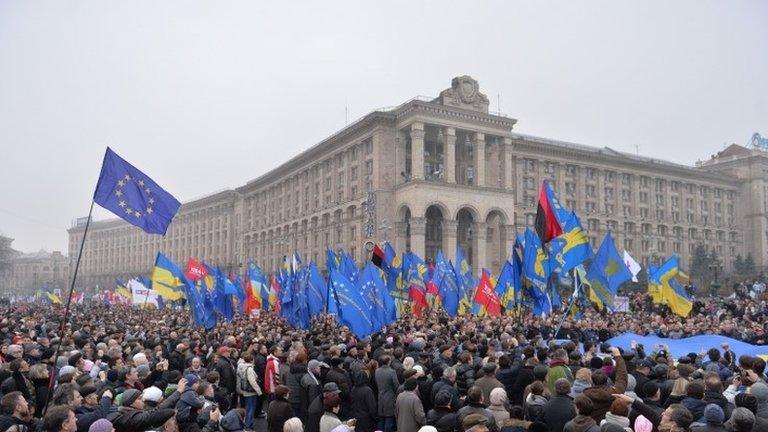
- Published25 November 2013
- Published27 January
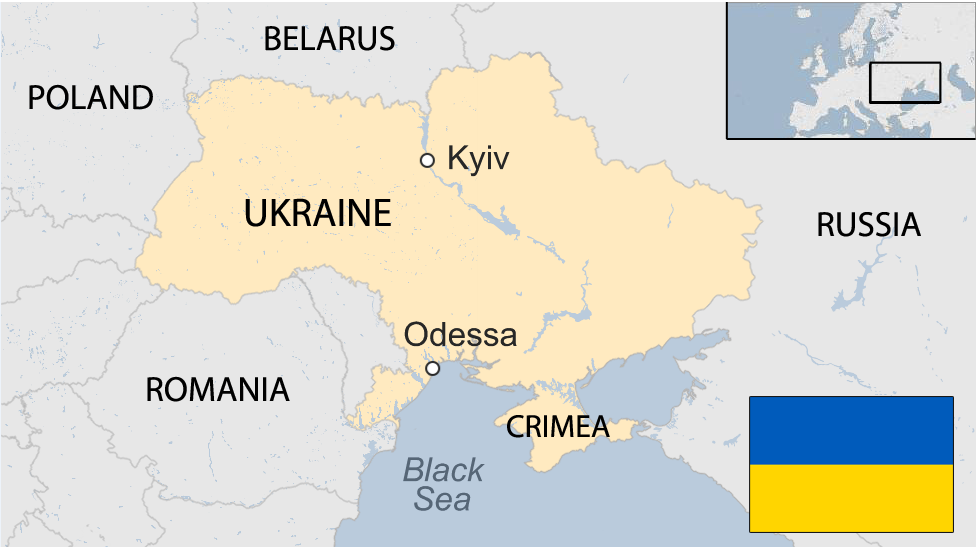
- Published22 November 2013
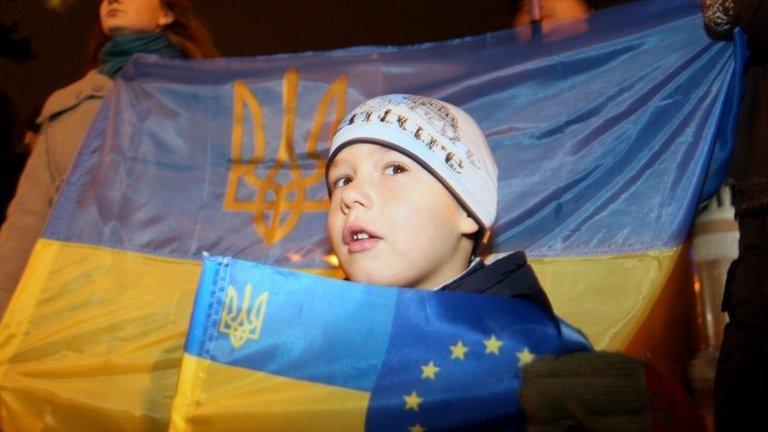
- Published22 November 2013
